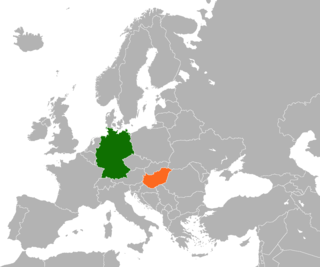Related Research Articles

Hungary wields considerable influence in Central and Eastern Europe and is a middle power in international affairs. The foreign policy of Hungary includes commitments to international development, international law, European integration, Atlantic co-operation and increased co-operation within the Global East. The Hungarian economy is fairly open and relies strongly on international trade.

Rugby union football, commonly known simply as rugby union or more often just rugby, is a close-contact team sport that originated at Rugby School in England in the first half of the 19th century. Rugby is based on running with the ball in hand. In its most common form, a game is played between two teams of 15 players each, using an oval-shaped ball on a rectangular field called a pitch. The field has H-shaped goalposts at both ends.

Rugby sevens is a variant of rugby union in which teams are made up of seven players playing seven-minute halves, instead of the usual 15 players playing 40-minute halves. Rugby sevens is administered by World Rugby, the body responsible for rugby union worldwide. The game is popular at all levels, with amateur and club tournaments generally held in the summer months. Sevens is one of the most well distributed forms of rugby, and is popular in parts of Africa, Asia, Europe, and the Americas, and especially in the South Pacific.
Gary Armstrong is a former Scotland international rugby union player. He played scrum-half for Jed-Forest RFC, Newcastle Falcons and the Border Reivers.
John Young Rutherford is a former Scotland international rugby union player. His regular playing position was Fly half.

The Portugal national rugby union team, nicknamed Os Lobos, represents Portugal in men's international rugby union competitions. The team, as well as all rugby union in Portugal, is administered by the Federação Portuguesa de Rugby.

Rugby union in Georgia is a popular team sport. Rugby union is considered one of the most popular sports in Georgia.

The Hungary national rugby union team is governed by the Hungarian Rugby Union. They have yet to qualify for the Rugby World Cup, although they have entered qualifiers for all the tournaments from the 1995 edition onwards. They compete annually in the European Nations Cup, currently in Division 2C.

Rugby union is a moderately popular team sport played in Romania with a tradition of more than 100 years. In past eras, the game had been more popular and Romanian national teams had been relatively highly ranked in world rugby, but their standing declined since the dawn of professionalism and the end of communism. The Romanian men's national team are currently 20th in the World Rugby Rankings as of 19 March 2023.

The Scout and Guide movement in Hungary is served by
Rugby union in Austria is a minor but growing sport. The national team is currently ranked 79th in the World Rugby's world rankings, which ranks only the top ninety-five countries.

Rugby union in Bosnia and Herzegovina is a minor sport. They are currently ranked sixty-eight in the International Rugby Board's world rankings, despite the lack of recognition as an official sport by the government. The governing body for the sport in the country is Rugby Federation of Bosnia and Herzegovina since 1992.

Rugby union in Croatia is a minor sport. As of August 2011, they are ranked fiftieth in the World Rugby's world rankings.

Rugby union in the Soviet Union was a moderately popular sport. It was most popular in the Georgian SSR; parts of the Russian SFSR such as Moscow and certain regions in Siberia like Krasnoyarsk; and Alma-Ata, the capital of the Kazakh SSR. Rugby enjoyed a more limited popularity in the Ukrainian SSR, Minsk in the Byelorussian SSR and parts of the RSFSR such as Leningrad and areas in Southern Russia, including Krasnodar. Rugby gained a significant following due to the vast size of the Soviet Union, but was never a major sport; despite many attempts to develop the sport, which Soviet citizens came to nickname the "leather melon" due to the shape of the ball. Still, an early championship in 1960 gives an idea of the sheer scale of Soviet rugby: one hundred teams from over thirty cities took part.
Rugby union in Yugoslavia was a moderately popular sport. It was most popular in the Croatian SR, and to a lesser extent in the Serbian and Slovenian SRs, with some presence in the Bosnian SR as well.

Germany and Hungary are both member states of the European Union, NATO, OECD, OSCE, Council of Europe and the World Trade Organization. Germany has an embassy in Budapest. Hungary has an embassy in Berlin, two general consulates and nine honorary consulates. The Agreement between the Federal Republic of Germany and the Republic of Hungary on 'Friendly Cooperation and Partnership in Europe' concluded on 6 February 1992 is one of the principal cornerstones of today's bilateral relations.
The Hungarian Rugby Union is the governing body for rugby union in Hungary. It was founded in 1990 and became affiliated to the International Rugby Board in 1992. It organises the three leagues, the Extraliga, the NB I and II, for what concerns rugby union. A few rugby 7s tournaments with also National 7s league and University Rugby 7s, and the various national teams. It is based in Esztergom.
The Hungary national women's rugby union team are the national women's rugby union team of Hungary. They have thus far only played in sevens tournaments and they have yet to qualify for the Women's Rugby World Cup.
References
- Richards, Huw A Game for Hooligans: The History of Rugby Union (Mainstream Publishing, Edinburgh, 2007, ISBN 978-1-84596-255-5)
- 1 2 3 4 5 Bath, Richard (ed.) The Complete Book of Rugby (Seven Oaks Ltd, 1997 ISBN 1-86200-013-1) p68
- 1 2 Laidlaw, p52
- ↑ Bath p63
- ↑ "International Rugby Board - HUNGARY". Archived from the original on 2011-09-26. Retrieved 2011-09-25. International Rugby Board - HUNGARY